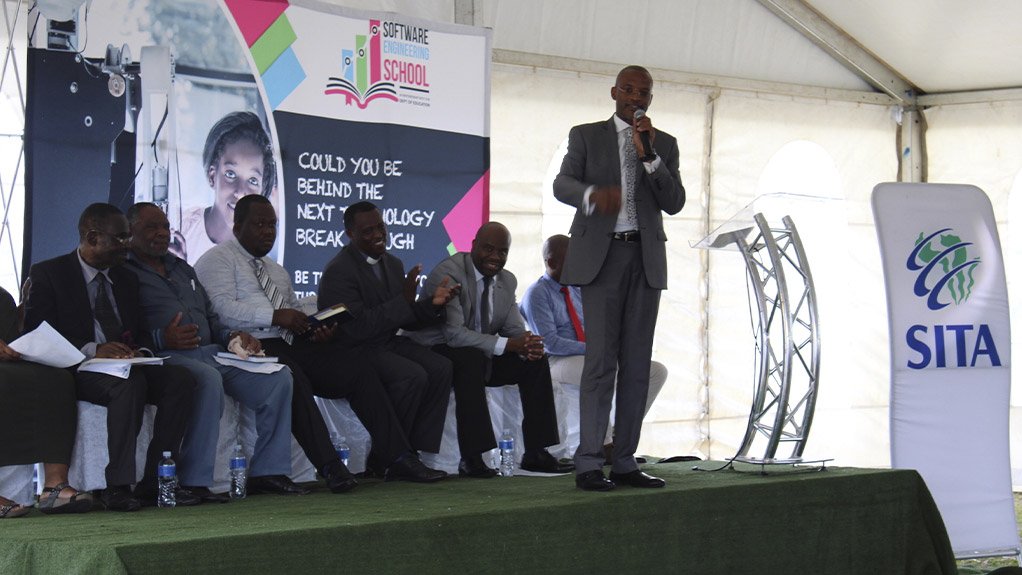/ MEDIA STATEMENT / The content on this page is not written by Polity.org.za, but is supplied by third parties. This content does not constitute news reporting by Polity.org.za.
Everyone should have an equal opportunity to make their mark in the world of technology – and it shouldn’t matter where they come from.
This was the message from State Information Technology Agency (SITA) executive caretaker and accounting authority Luvuyo Keyise at the opening of a SITA-sponsored ICT laboratory at Manhlenga Junior Secondary School in Gazini village, in the uMhlabuyalingana Local Municipality, on Friday 7 February 2020.
uMhlabuyalingana, in the far north-eastern part of KwaZulu-Natal, is one of South Africa’s most remote communities – the school is 7km from the Mozambique border.
SITA executive caretaker and accounting authority Luvuyo Keyise speaks at the
opening of a SITA-sponsored ICT laboratory at Manhlenga Junior Secondary School
The ICT laboratory – or cyberlab – sponsorship forms part of SITA’s GovTech initiative. The handover event also marked the launch of a strategic partnership between SITA and the KwaZulu-Natal government regarding the establishment of SITA’s School of Software Engineering (SOSE) in the province.
The SOSE aims to build a digital society and embrace digital inclusivity by upskilling learners with ICT skills. The curriculum includes, but is not limited to, digital literacy, programming principles and advanced digital literacy training.
The SOSE is a national initiative that SITA introduced last year as a long-term sustainable investment in provincial schools. In accordance with its business development plan, SITA is implementing the SOSE one province at a time.
Manhlenga Junior Secondary School has humble beginnings and the school and community are buoyed by the investment. The school has 303 learners from Grades 8 to12, and 11 educators. Efforts are being channelled into ensuring a conducive environment for learners to engage with and learn ICT skills, and be empowered by the opportunities these will offer in the future.
The facility at the school is housed in a repurposed shipping container, and has 20 workstations with desktop computers and a local area network. The container has vinyl flooring, a door and windows, an air conditioner, an interactive whiteboard, a data projector, and desks and chairs. The school has electricity and will soon have internet connectivity.
Keyise emphasised SITA’s willingness to invest in the future of the learners, in order to create the workforce of the future through digital skills and potentially change the future of people in this small rural community. “Through digital technology, access and investment, the goal is to eradicate spatial, class and material inequalities. SITA will continue to invest in digital transformation for the benefit and convenience of citizens, and for posterity,” he said.
SITA has been hard at work ensuring positive change for young people, by providing them with the ICT skills with which to transform their lives, their communities and the country. One of SITA’s endeavours, as part of its corporate social responsibility efforts, is to work with academic partners to engineer and develop schools’ curricula to include ICT initiatives such as coding and software development, as well as other digital skills.
“It’s an open secret that the world is migrating to 4IR. This is a historical dream come true for us. It belongs to us. It’s our pride. And we will do all in our power to keep it safe and clean. Thank you, SITA,” said one of the learners as part of the official opening ceremony of the cyberlab. This summed up the overall sentiments of the youth at Manhlenga Junior Secondary School.
The chairperson of the School Governing Body, Ms BL Mthembu, called on the community to treasure, protect and build on the investment so that it remains a beacon of hope and inspiration for the community.
The district director, Mr TJ Motha, expressed his appreciation for the work done by SITA. He also encouraged the learners to remain inspired, noting that the school has 35 Grade 12s this year. “Digital inclusivity is about ensuring that no kid is left behind. Closing the spatial divide through technology is key,” he said.
Issued by The KZN State Information Technology Agency
EMAIL THIS ARTICLE SAVE THIS ARTICLE ARTICLE ENQUIRY
To subscribe email subscriptions@creamermedia.co.za or click here
To advertise email advertising@creamermedia.co.za or click here











